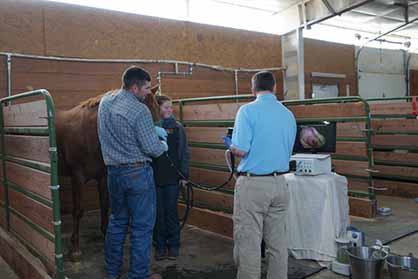Protect the Stomach Before and During Changing Training Barns, Switching Ownership, or Learning New Disciplines
“All the changes that come in a horse’s life can trigger health issues, including ulceration of the stomach lining,” says Sarah Reuss, VMD, DACVIM, Large Animal Veterinary Services, Internal Medicine, Boehringer Ingelheim Animal Health. “Ulcer prevention should be considered every time a horse’s routine is modified.”
A Plan for Ulcer Prevention
“Along with the countless other details horse owners have to take care of when starting a horse in a training program or moving to a new barn or owner, ulcer prevention needs to be part of the plan,” Reuss says. “It’s also important to remember to start ULCERGARD 36 to 48 hours before the stressful event to allow it to reach the bloodstream to suppress the acid pumps in the stomach.”
Look for Signs of Ulcers
“It’s important to know what’s going on with your horse when they’re being integrated into a new program,” Reuss says. “This may lessen the chance of stomach ulcers causing performance issues that may derail training later on.”
Signs of ulcers include:
- Less-than-optimal (poor) performance, resistance to work, difficulty training4
- Change in attitude for the worse4
- Decreased or picky appetite4
- Weight loss or poor body condition4
- Recurrent colic4
- Dull hair coat4
Equine stomach ulcers can happen in as little as 5 days.3 If your horse is diagnosed with ulcers, you can start treatment without stopping training with GASTROGARD®(omeprazole), the only proven and FDA-approved product containing specially formulated omeprazole that blocks acid production at the source for the treatment of gastric ulcers.5
Some affected horses won’t show overwhelming signs of ulcers.4 Reuss says the only way to definitively diagnose stomach ulcers is to perform a gastroscopy, also known as a “scoping.” It provides the extra benefit to assess current stomach conditions and, if ulcers are present, grade them. If your veterinarian’s practice doesn’t have a scope, ask for a referral in the area.
Healthy as a Horse
Whatever the reason for a change in your horse’s routine, make sure they settle in. If your horse will experience a life change in the future, be sure to contact your veterinarian to ask for ways to help the transition go smoothly.
Caution: Safety of GASTROGARD in pregnant or lactating mares has not been determined.
About Boehringer Ingelheim Animal Health
On January 1st, 2017, Merial became part of the Boehringer Ingelheim group. As the second largest animal health business in the world, Boehringer Ingelheim is committed to making the industry even better at improving animal health. With more than 10,000 employees worldwide, Boehringer Ingelheim Animal Health has products available in more than 150 markets and a global presence in 99 countries. For more information about Boehringer Ingelheim Animal Health, click here.
About Boehringer Ingelheim
Boehringer Ingelheim is one of the world’s 20 leading pharmaceutical companies. Headquartered in Ingelheim, Germany, Boehringer Ingelheim operates presently with a total of some 50,000 employees worldwide. The focus of the family-owned company, founded in 1885, is on researching, developing, manufacturing and marketing new medications of high therapeutic value for human and veterinary medicine. In 2015, Boehringer Ingelheim achieved net sales of about 14.8 billion euros. R&D expenditure corresponds to 20.3 per cent of net sales. For more information, please visit www.boehringer-ingelheim.com.
Merial is now part of Boehringer Ingelheim.
®GASTROGARD and ULCERGARD are registered trademarks of Merial. ©2017 Merial, Inc., Duluth, GA. All rights reserved. EQUIUGD1708 (6/17)
2Murray MJ. Disorders of the stomach. In: Smith BP, ed. Lg Anim Int Med. St. Louis; CV Mosby, 1990:710-717.
3McClure SR, Carithers DS, Gross SJ, Murray MJ. Gastric ulcer development in horses in a simulated show or training environment. J Am Vet Med Assoc. 2005;227(5):775-777.
4Equine Gastric Ulcer Council. Recommendations for the diagnosis and treatment of Equine Gastric Ulcer Syndrome (EGUS). Equine Vet Educ. 1999;11:262-272.
5GASTROGARD product label.











